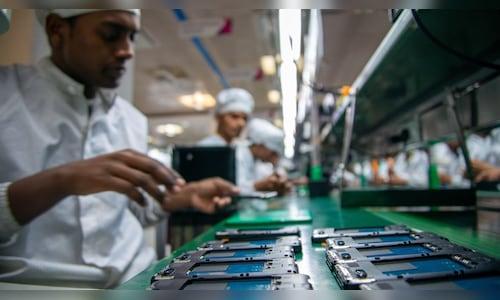At ₹360 crore, the market value of the Bengaluru-based Triton Valves is significantly less than the ₹490 crore revenue it clocked in the financial year ended March 2025. And, it aims to double the annual revenue run rate to ₹1,000 crore in the next three to five years.
The projection implies a compounded annual growth rate (CAGR) of 18%, similar to the last five years, which may not be sufficient given the abysmally low 1% return on equity during the period.

Managing Director Aditya M Gokarn says he’s working on the problem. “We have invested in building our two new verticals: Future Tech, which is our metals business and Climatech, which is our climate control business. The return on equity will see a significant increase as these verticals scale up,” he told CNBC-TV18 in an interview.
Future Tech, a brass mill, started commercial production four years ago. Most of the products that the rest of the business manufactures are made of brass; therefore, Triton is expanding the capacity of its brass mill going ahead.
Climate Tech, which makes valves and components for the room air conditioners, and was selected for the government’s production-linked incentives to substitute products that used to be imported, would get merged with the parent entity soon, the management told analysts in March this year.
"Our EBITDA margin currently stands at 5.5-6%. The climate control business hasn't yet achieved critical mass, but once volumes pick up and pricing barriers ease, we expect healthy margin improvement. The automotive business operates at around 9-10% EBITDA and should move into double digits soon," he added.
EBITDA stands for earnings before interest, tax, depreciation, and amortisation, and it measures the profitability of the core business.
Founded in 1975 by MV Gokarn with ₹1 lakh of personal savings, Triton Valves was listed two years later as India's first indigenous tyre valve manufacturer.
Today, the company claims to have over two-thirds market share in valves one sees in the tyre tubes, supplying to tyre makers like MRF, Apollo and JK Tyre.
From its three manufacturing plants, Triton also supplies components to leading electric vehicle makers Ather Energy and TVS Motor, manufacturing pressure relief valves for EV battery banks, a patented in-house product.
Triton plans on scaling up the two new verticals. "We're not just a tyre valve company anymore. We've evolved into a diversified precision engineering firm with exposure across passenger, commercial, two-wheeler, and electric vehicle segments," Gokarn said.
Triton also counts carmakers like Maruti, Tata Motors, and Hyundai, AC makers like Lloyd and Samsung among its customers, and is gunning for a piece of a market that it estimates would be worth ₹17,000 crore in the next decade.
"The brass and metals market in India is about ₹15,000 crore, while the climate control segment is around ₹2,000 crore," Gokarn said. "Currently, our climate control vertical contributes ₹20-30 crore, but the potential is 10-15 times that once we reach higher volumes and address Chinese dumping challenges.
How to value a stock like Triton?
These are the top five auto component stocks in India by market capitalisation
| Stock | Market cap | P/E ratio (current) |
| Samvardhana Motherson | ₹1.10 lakh crore | 32.51 |
| Belrise | ₹13,241 crore | 33.5 |
| Varroc | ₹9,316 crore | 49.4 |
| Pricol | ₹6,457 crore | 37.7 |
| Carraro | ₹2,961 crore | 33.9 |
P/E stands for price-to-earnings ratio, which is a measure of valuation, expressed as a multiple of the earnings per share. A high P/E ratio reflects a bigger valuation for the stock.
A typical auto components maker would be valued at 18-25 times the estimated earnings one year ahead, while niche companies with strong products and robust margins command a multiple of 40 to 50, according to Hitesh Thakurani, analyst at HDFC Securities.
“Companies making valves are typically valued below the average of auto ancillary firms as they are relatively lower-technology products and are part of the internal combustion engine (ICE) segment, which continues to face headwinds from the electric vehicle transition,” Thakurani added.
There are no analysts covering the stock, so there are no estimates. Triton trades at a high 71 times the trailing 12-month earnings, according to data from Screener, a stock research platform.
To draw more investors, Gokarn’s will have to show that he can deliver the growth in profitability that he has promised.
“Companies with leadership in niche auto components and consistent growth of over 10% CAGR are often valued higher than original equipment manufacturers (OEMs) as their business risk is diversified,” Ashwin Patil, Head of Fundamental Research at LKP Securities, which recommends stocks like SJS Enterprises, Pricol, and Belrise, said.
Down over 40% in 2025, shares of Triton Valves Ltd. were placed under Stage 1 of the Additional Surveillance Measures (ASM) framework, which requires investors to put 100% as margin and daily price movements are capped, on September 22 by the BSE stock exchange.

 1 month ago
1 month ago









